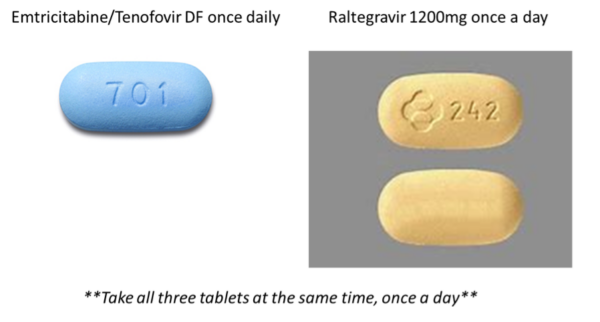What is PEP?
PEP involves taking 3 antiretroviral (anti-HIV) drugs for 4 weeks after possible exposure to HIV in order to reduce the risk of getting HIV infection. The exposure may be from sex without a condom, sharing of needles/works or occupational exposure for a healthcare worker.
Most people in the UK living with HIV take anti-HIV medication and have an undetectable viral load. This means they will not pass on the virus through sex.
Does PEP work and how?
It takes 48-72hrs for HIV infection to get into the blood after entering the body. By taking PEP early, HIV infection may be prevented. PEP works best the earlier it is given, and is unlikely to work if started more than 72hrs after exposure. Even if taken within 72 hours there is no guarantee that PEP will work.
Studies show it needs to be taken for 28 days.
Anyone taking PEP should avoid having unprotected sex, getting pregnant or donating blood until they have been retested for HIV at 8 weeks after completing PEP.
How is PEP taken?
You must take the medication you have been given as directed on the packaging. Mixing up doses and times will change drug levels in your body and may mean PEP is not effective. Please ask if you are not sure.
You will have been given the following:
- Tenofovir/Emtricitabine(combined) (blue) – One tablet daily (take at the same time every day with or after food.) This is two drugs combined together in one tablet.
- Raltegravir 1200mg (Yellow) – Two tablets of 600mg (take with/without food). Taken at the same time with the Tenofovir/Emtricitabine(combined) (blue) ie. all 3 tablets taken together.
A standard PEP pack usually contains 30 days. A course of PEP is for 28 days, so you may be advised to discard the last 2 days of tablets.

If you are pregnant or have other medical conditions you may have been given:
- Tenofovir/Emtricitabine(combined) (blue) – One tablet daily (take at the same time every day with or after food.) This is two drugs combined together in one tablet.
AND - Raltegravir 400mg (pink) – one tablet taken twice a day, 12 hours apart (take with/without food).
Are there any dangers to taking PEP?
- PEP can cause some side effects including nausea, vomiting and headaches but these are usually mild and do not normally require any treatment.
- PEP may occasionally cause changes in liver/kidney function. For this reason, blood tests are taken before you start. These changes tend to resolve after stopping PEP.
- PEP may interact with other drugs or affect the way they work. Whilst taking PEP do not use any ‘recreational drugs’ or herbal remedies or antacids. Multivitamins should not be taken at the same time (space apart by at least 2 hours)
- It is very important not to miss any doses, as this may mean the PEP does not work. If you forget a dose, take it as soon as you remember, and then continue the next medications at your usual time. If you are more than 24 hours late call for advice
Will anyone who asks for PEP get it?
- PEP will only be offered if a person has been at significant risk of catching HIV.
- PEP should not be given to someone with HIV. If you already have HIV, or test positive for it, the clinician will advise you on your next steps.
- PEP is not given if it has been more than 72 hours since your risk.
Are people immune to catching HIV whilst taking PEP?
There is good evidence supporting the use of emtricitabine/tenofovir to protect against HIV transmission (pre-exposure prophylaxis or ‘PrEP’) but PrEP is only effective if taken before and after sex. We strongly advise condom use whilst taking PEP to protect yourself and others until your final HIV status is known – or to abstain from sex. Speak to Leeds Sexual Health staff about future PrEP after your PEP course.
I have been given PEP - what now?
A full PEP course is 28 days. You should have enough medication to complete this. Please contact Leeds Sexual Health during clinic hours, to arrange a follow-up appointment. Please see our current clinic information by visiting our service finder. Leeds Sexual Health will arrange follow up HIV testing and other tests e.g. for sexually transmitted infections.
If you are given a prescription for your PEP from Leeds Sexual Health you will only be able to collect this from the Boots pharmacy at the LGI (you cannot get these tablets at local pharmacies):
Leeds General Infirmary, Great George Street, Leeds LS1 3EX
Tel: 0113 2457177
Links to other useful pages
Related pages
Contact us
If you need further information about opening times and how to contact us please visit the contact us page.

